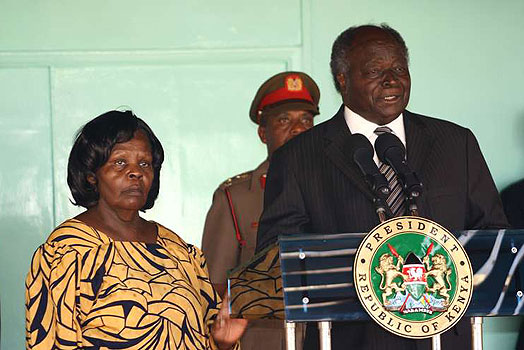How Kenyan presidents have repeatedly (mis)treated the media
The continued attack, stereotyping and labelling of the mainstream media content as ‘fake news’ by the political class, particularly the government of the day, has become the bane of Kenyan media over the years.
Since independence, successive governments in Kenya have been unfriendly, disdainful and hostile to an independent media.
Even with clauses on media freedom enshrined in the Constitution, successive governments have always related with the media in way that clearly shows that they would be happier to roll back the gains of an independent media.
Right from the era of President Mzee Jomo Kenyatta, President Daniel Arap Moi, President Mwai Kibaki (all deceased), retired President Uhuru Kenyatta to President William Ruto, the Kenyan media has over the years been under a relentless attack from the Executive arm of the government.
We sample the most classic incidents:
President William Ruto – Just a few days ago, the President hit out at the media with accusations of peddling propaganda against his government. According to the Head of State, the media has been covering him in bad light because of its perceived support for Azimio la Umoja – One Kenya Coalition leader Raila Odinga.
“Sometimes we try to understand why the media supported a different candidate in the 2022 presidential and their candidate lost. Once the election is over, we should be democratic to say I supported a different candidate but since this character won, I don’t like him very much but because it is democracy, let us support what is positive and good for the country and oppose when it is necessary,” President Ruto said.

Deputy President Rigathi Gachagua has been more brutal in his onslaught on the media since he assumed office.
In his address during the 2023 Madaraka Day celebrations in Embu on June 1, 2023, the DP claimed the media is ‘inciting the public against the passage of the Finance Bill 2023’
Kericho Senator Aaron Cheruiyot, a close ally of President Ruto, has been similarly disdainful of the media. Senator Cheruiyot is on record for terming the media as part of ‘extremely powerful cartels’ in the country.
“President Ruto will succeed in crushing every cartel in the country save for two that are extremely powerful, banks and media. Both are very powerful, influential and synergise so well to protect each other’s interest. For public good, a way must be found,” the senator tweeted sometime in March this year.
President Uhuru Kenyatta – The retired president once famously said “gazeti ni ya kufunga nyama (newspapers are only useful in wrapping meat)” apparently to spite the Kenyan media over what at the time he termed as slanted and inaccurate news coverage by the Fourth Estate.
That was way back in 2015, when Mr Kenyatta was midway into his first term of office. And just like that, Kenyan journalists took up the unflattering nickname “meat wrappers.”

Mr Kenyatta’s infamous remarks showed just how lowly he thought of the Kenyan media and the journalism profession in general.
President Mwai Kibaki – The most poignant incident that laid bare President Kibaki’s hostility to the media happened on May 2005, when the then First Lady the late Mama Lucy Kibaki stormed Nation Centre to protest about a story of how she interrupted a party at the home of the then outgoing World Bank country director Makhtar Diop.
During her one-woman siege on Nation Center, the former First Lady confiscated notebooks, pens, cameras and tape recorders from journalists who were following her protests.

She also demanded the arrest of the reporter and editor who filed the story of her visit to Muthaiga Police station and reportedly recorded a statement.
The First Lady arrived at the Nation Center just before midnight with a six-man security detail in tow and stayed on until 5am to the anguish of the unlucky journalists who found themselves in her company.
President Daniel Arap Moi – The Moi-era was one dark period for the media and Kenyan journalists in general. Arbitrary arrests, unlawful detentions and trumped up charges were the order of the day for any journalist who had the nerve to report stories that the state deemed “unfavourable.”

In comparison to the Moi-era clampdown on the freedom of the media, the “meat wrappers” and “cartel” slur could as well be music to the ears of Kenyan journalists.
President Jomo Kenyatta – During the era of Kenya’s first president, Mzee Jomo Kenyatta, media freedom was infringed. Freedom of writing negative stories was not allowed. It was also reported that Kenyatta tried to get one of his relatives to control the Nation Media Group.

Also read:
Rigathi Gachagua in fresh media attack
From meat wrappers to cartels: Kenyan media is every politician’s punching bag
Unapologetic Senator Cheruiyot insists Kenyan media is a ‘cartel’



